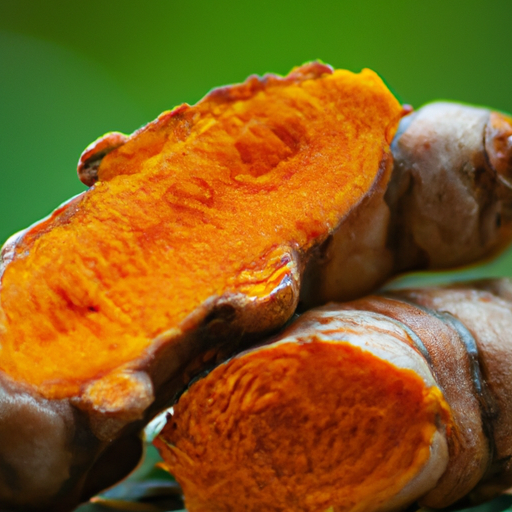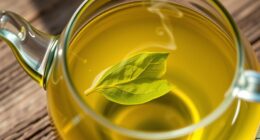Picture waking up in the morning to a vibrant sunrise painting the sky in shades of gold and orange. Stepping outside, the fresh air fills your lungs, exciting your senses. Just like nature can heal and rejuvenate, certain natural remedies also have the ability to relieve discomfort and improve our overall wellness.
One such remedy that has gained attention in recent years is turmeric. Known for its vibrant yellow color and earthy flavor, turmeric has been used for centuries in traditional medicine for its potential anti-inflammatory properties. But does turmeric hold the key to relieving intestinal inflammation?
In this article, we will delve into the scientific research surrounding turmeric and its effects on intestinal inflammation. By examining the evidence, we can determine whether turmeric truly lives up to its reputation as a natural remedy for intestinal discomfort.
Key Takeaways
- Turmeric contains curcumin, which has potential anti-inflammatory properties.
- Turmeric can inhibit inflammatory pathways and suppress pro-inflammatory cytokines.
- Turmeric supplementation can reduce markers of inflammation in inflammatory bowel disease.
- Turmeric may help promote a healthy balance of gut bacteria and reduce intestinal inflammation.
Understanding Intestinal Inflammation
To better understand intestinal inflammation, I delved into the intricate mechanisms that contribute to this complex condition. It occurs when the lining of the intestines becomes inflamed, leading to symptoms such as abdominal pain, diarrhea, and bloating.
There are several factors that can trigger intestinal inflammation, including infections, autoimmune disorders, and certain medications. Research has shown that chronic inflammation in the intestines can increase the risk of developing conditions like inflammatory bowel disease and irritable bowel syndrome.
Understanding the underlying causes of intestinal inflammation is crucial in developing effective treatment strategies. Now, let’s delve into the anti-inflammatory properties of turmeric and its potential benefits in managing intestinal inflammation.
The Anti-Inflammatory Properties of Turmeric
One of the reasons people love using turmeric is because it has incredible anti-inflammatory properties. Turmeric contains a compound called curcumin, which has been shown to inhibit multiple inflammatory pathways in the body.
Here are five key ways in which turmeric can help reduce intestinal inflammation:
-
Curcumin suppresses the production of pro-inflammatory cytokines, molecules that play a crucial role in promoting inflammation.
-
Turmeric inhibits the activity of nuclear factor-kappa B (NF-kB), a protein complex that triggers the release of inflammatory molecules.
-
Curcumin enhances the production of anti-inflammatory molecules, such as interleukin-10, which helps regulate the immune response.
-
Turmeric can reduce oxidative stress, a key contributor to inflammation, by neutralizing harmful free radicals.
-
Curcumin can modulate gut bacteria composition, promoting a healthy balance and reducing inflammation in the intestines.
These properties of turmeric make it a promising natural remedy for intestinal inflammation. Transitioning into the next section, let’s explore the research studies conducted on turmeric and its effects on intestinal inflammation.
Research Studies on Turmeric and Intestinal Inflammation
Explore the groundbreaking research studies that have delved into the remarkable effects of turmeric on reducing inflammation in your gut. These studies have provided compelling evidence for the potential benefits of turmeric in alleviating intestinal inflammation.
One study published in the Journal of Clinical Immunology found that curcumin, the active compound in turmeric, can modulate the inflammatory response in the gut by inhibiting the production of pro-inflammatory cytokines.
Another study conducted by researchers at the University of California, Los Angeles, demonstrated that curcumin can inhibit the activation of NF-kB, a key inflammatory pathway involved in intestinal inflammation.
Furthermore, a systematic review and meta-analysis of multiple studies concluded that turmeric supplementation can significantly reduce markers of inflammation in individuals with inflammatory bowel disease.
These findings highlight the promising potential of turmeric as a natural remedy for intestinal inflammation.
Transitioning into the subsequent section, let’s now explore the potential benefits of turmeric for intestinal inflammation.
Potential Benefits of Turmeric for Intestinal Inflammation
Uncover how this golden spice may bring relief to your gut, soothing and calming the fiery storm inside.
Turmeric has shown potential benefits for intestinal inflammation due to its active compound called curcumin. Curcumin has been found to possess anti-inflammatory properties, which can help reduce inflammation in the intestines. It works by inhibiting the production of inflammatory enzymes and signaling molecules in the body.
Additionally, curcumin has been shown to enhance the production of anti-inflammatory cytokines, further contributing to its anti-inflammatory effects. Some research studies have even suggested that curcumin may be as effective as certain anti-inflammatory drugs in alleviating symptoms of intestinal inflammation.
To incorporate turmeric into your diet and experience its potential benefits, stay tuned for the next section on how to use turmeric in your daily meals.
How to Incorporate Turmeric into Your Diet
To add a touch of the ‘golden sunrise’ to your meals, consider incorporating this flavorful spice into your daily cooking repertoire. Turmeric can be easily added to a variety of dishes, making it a versatile ingredient to have in your kitchen. Here are some simple ways to incorporate turmeric into your diet:
- Sprinkle it on roasted vegetables or scrambled eggs for a vibrant color and earthy flavor.
- Mix it into soups, stews, or curries for a warm and aromatic kick.
- Blend it into smoothies or juices for a healthy boost.
- Brew a cup of golden milk by combining turmeric with warm milk and a touch of honey.
- Use it as a seasoning for marinades or rubs for a flavorful twist.
By incorporating turmeric into your meals, you can enjoy its potential benefits for intestinal inflammation. However, it is important to be aware of the potential risks and side effects of turmeric.
Potential Risks and Side Effects of Turmeric
Try not to overdo it with turmeric, as excessive consumption can lead to potential risks and side effects that you should be mindful of. While turmeric is generally considered safe when consumed in moderation, here are a few things to keep in mind:
-
Stomach upset: In some cases, consuming too much turmeric can cause nausea, diarrhea, or an upset stomach. It’s important to listen to your body and adjust your intake accordingly.
-
Blood thinning: Turmeric contains a compound called curcumin, which has blood-thinning properties. If you’re already taking blood-thinning medications, excessive turmeric consumption may increase the risk of bleeding.
-
Allergic reactions: Although rare, some individuals may be allergic to turmeric. If you experience any allergic symptoms such as hives, itching, or difficulty breathing, seek medical attention immediately.
-
Interactions with certain medications: Turmeric may interact with certain medications such as blood thinners, diabetes medications, and stomach acid reducers. It’s advisable to consult with your healthcare provider before adding turmeric to your routine.
Considering these potential risks and side effects, it’s important to use turmeric responsibly and in moderation.
CONCLUSION: Is turmeric effective for intestinal inflammation? [sentence transition]
Conclusion: Is Turmeric Effective for Intestinal Inflammation?
You might be surprised to learn that the potential benefits of incorporating turmeric into your diet extend beyond just adding flavor to your meals. Studies have shown that turmeric contains compounds with anti-inflammatory properties, such as curcumin, which may help reduce intestinal inflammation. However, it is important to note that the effectiveness of turmeric for treating intestinal inflammation may vary from person to person, and more research is needed to fully understand its impact. It is also worth considering that turmeric may have potential risks and side effects, such as gastrointestinal issues or interactions with certain medications. Therefore, it is always advisable to consult with a healthcare professional before using turmeric as a treatment for intestinal inflammation.
To summarize the potential benefits and risks of turmeric for intestinal inflammation, I have created a table below:
| Potential Benefits | Potential Risks and Side Effects |
|---|---|
| Anti-inflammatory properties | Gastrointestinal issues |
| May help reduce intestinal inflammation | Interactions with certain medications |
| Allergic reactions |
While turmeric may hold promise as a natural remedy for intestinal inflammation, further research is needed to determine its effectiveness and safety. It is always important to approach any treatment with caution and seek professional medical advice.
Frequently Asked Questions
What are the common symptoms of intestinal inflammation?
Intestinal inflammation can cause symptoms such as abdominal pain, cramping, diarrhea, and blood in the stool. It is important to seek medical advice for a proper diagnosis and treatment plan.
Can turmeric be used as a preventive measure for intestinal inflammation?
Turmeric shows promise as a preventive measure for intestinal inflammation due to its anti-inflammatory properties. Studies suggest that its active compound, curcumin, can reduce inflammation in the intestines and may help prevent chronic inflammation.
Are there any specific recommendations for the dosage of turmeric for treating intestinal inflammation?
There is no specific dosage for turmeric in treating intestinal inflammation. However, studies suggest that a daily dose of 500-2,000 mg of curcumin, the active compound in turmeric, may be beneficial.
Are there any other natural remedies that can be used in conjunction with turmeric for intestinal inflammation?
Yes, there are other natural remedies that can be used in conjunction with turmeric for intestinal inflammation. Some options include ginger, slippery elm, aloe vera, and chamomile tea.
Can turmeric be used to treat other gastrointestinal conditions besides intestinal inflammation?
Turmeric has been studied for its potential benefits in treating various gastrointestinal conditions. Research suggests it may help with conditions like inflammatory bowel disease, irritable bowel syndrome, and gastric ulcers.
Conclusion
In conclusion, based on the available evidence, it can be concluded that turmeric is effective for intestinal inflammation. Numerous research studies have shown that turmeric possesses anti-inflammatory properties that can help reduce inflammation in the intestines.
While some may argue that the effects of turmeric are minimal, it’s important to consider that incorporating turmeric into your diet, along with other lifestyle changes, can have a significant impact on intestinal health. So, don’t hesitate to add a dash of turmeric to your meals and experience the potential benefits it can offer for intestinal inflammation.










